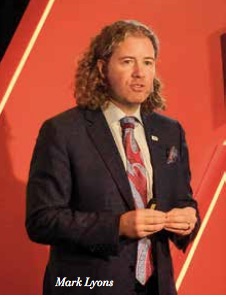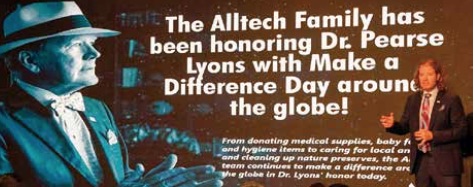
The three big changes and challenges facing agriculture today are climate change, demographics, and technology, according to Mark Lyons, CEO of Alltech.
The pace of change over the past 20 years since Alltech first started operating in Thailand has been staggering. For example, Asia is now the engine of economic growth for the entire world.
“It’s incredible for me to see just how different this country is than the country I first visited about 20 years ago,” said Mr Lyons, at a recent celebration in Bangkok marking the company’s two decades in Thailand.
“This is now definitely a country full of middle class people on the rise.”
Climate change
“I see in general much greater concern about the environment. A lot of people have been talking and worrying about the environment for years, but now policymakers and people in power are actually talking about making changes,” said Mr Lyons.

A recent report on what would happen if the global temperature rises by 1.5 degrees found that many of the destructive impacts such as desertification and mass migration foreseen at two degrees would happen happen earlier.
“It was scary stuff. But what’s even scarier is that the temperature of the Earth has already increased one degree. With only a half a degree to go, we might actually get to that 1.5 degrees by 2030,” he said.
Air pollution is also a challenge, with a recent study finding that 90% of all children, whether in rich or poor countries, are being adversely impacted by toxic air.
“How does agriculture play a role? Can agriculture take a leadership position, instead of being targeted for the impact that we have on the environment?”
Demographics
Demographics are changing dramatically. He noted that in the first time in the history of the world, there are more people in the middle class than there are poor. With 3.8 billion people in the middle class or richer, and that figure projected to reach 5.6 billion by 2030, big challenges await governments and companies.
“That’s an astounding achievement. Not by one country, but by all of humankind together,” said Mr Lyons.
Businesses are faced with the huge opportunity and challenge of creating products for the new middle class, and Alltech is no different.
Technology
Agriculture is the least digitized of all sectors. But that just means the scope of opportunity is the greatest, said Mr Lyons.
“Information technology is changing everything, every industry, everything we do from the moment we wake up to the moment we go to bed and everything in between,” he said.
Huge amounts of funding is flowing into agri-tech, making it the fastest growing sector in agriculture.
People assume incorrectly that technology is just for computer-savvy young people, but in fact, the average age of new start up entrepreneurs is 45.
Mr Lyons admitted that he always hated it whenever his father, Alltech founder Dr Pearse Lyons, who passed away last year, would give rousing talks urging people to pursue their entrepreneurial ideas and dreams.
“He sometimes forgot that he was actually talking to a group of Alltech people. We would be very worried that half of them would walk out and quit,” he said.
But, on the other hand, if people have ideas, maybe it’s an opportunity to collaborate or do something different.
Technologically changes usually manifest as disruption, and the big question for companies is how to get ahead of the curve and do the disrupting themselves, instead of falling victim to someone else’s disruptive innovation.
What would his father say if he was watching his son right now?
“I know what he would say: Mark, you’ve talked too long. Make it simple. Give them five things to remember.”
In closing, Mr Lyons listed those five things: engage with young people by giving them real responsibilities and autonomy, use new technology, anticipate and embrace change, always dream, and make a difference.
To continue Dr Pearse Lyons’s legacy, August 3 of each year has been dedicated for staff to undertake projects aimed at “making a difference” with the goal of creating a “planet of plenty.”

